Episodes
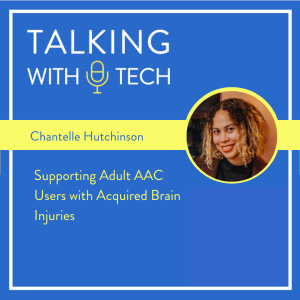
Thursday May 09, 2024
Thursday May 09, 2024
This week, we share Rachel’s interview with Chantelle Hutchinson (@dysphagiacommunity)! Chantelle is a Speech-Language Pathologist who works with adults with acquired brain injury and progressive neurological conditions. She shares about some of the factors that make working with clients with acquired brain injuries, like traumatic brain injury (TBI) and stroke, unique, including: how AAC needs can be different, the impact of frequently changing communication partners, the value of getting to know the client before writing goals, and more!
Before the interview, Chris and Rachel chat about why podcasting should be considered and supported more often as a form of professional development. When we make education more engaging, it leads to better outcomes and retention!
Key Ideas This Week:
🔑 Some people who have a TBI or stroke may not understand that they are communicating differently or their communication partner is not understanding. This can impact buy-in, because the client may not see much need for the device if they are not aware of the communication breakdowns.
🔑 We don’t always target building awareness about communication breakdowns for a client with a TBI or stroke. It takes a balance, because if a client is totally unaware, it can impact their ability to know when to use strategies (like AAC), but being highly aware of communication difficulties may lead to lower mental health outcomes overall.
🔑 A therapist working with TBI and stroke needs to keep in mind the client’s cognitive profile - some may never get to the point where they can initiate a conversation, no matter how much you practice the skill. In that situation, try and consider if the client’s needs are being met naturally and how you can best support them given their cognitive profile.
Links from This Week’s Episode:
Talking Mats: https://www.talkingmats.com/
Visit talkingwithtech.org to listen to previous episodes, find new resources, and more!
Help us develop new content and keep the podcast going strong! Support our podcast at patreon.com/talkingwithtech!
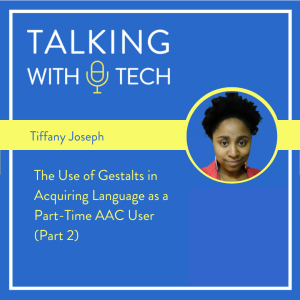
Friday May 03, 2024
Friday May 03, 2024
This week, we share part two of Rachel’s interview with Tiffany Joseph! Tiffany is an autistic mother of three neurodivergent teens, as well as an educator, advocate, and a part-time AAC User with inconsistent verbal speech. She shares about her experience as a gestalt language processor, how she thinks AAC could help students mitigate their gestalts, her perspective on Spelling to Communicate, and more!
Before the interview, Chris and Rachel answer a listener question about “seasoned SLP‘s” in the listener’s school district who said that “high-tech AAC wasn’t appropriate for kids with lots of behaviors.” Chris and Rachel discuss the question, noting that behaviors are often reduced when a student has a device, and they wonder whether those “seasoned” SLPs should reconsider their openness to new ideas.
🔑 Chris’s motto is “education instead of restriction,” meaning we should teach people how to use new things (like AI, etc) rather than just try and restrict or block them in the schools. In his experience, you can restrict a particular app or website but it’s better to teach students to use the tool in a better way.
🔑 Tiffany said it would’ve been really helpful for her communication growing up if she could’ve had a device that displayed the first half one of her gestalts, followed by different logical alternative endings that she could choose from to help her mitigate her gestalts.
🔑 Tiffany believes that spelling to communicate is a valid form of communication and doesn’t believe it should be controversial. She feels that, similar to “body doubling,” where the presence of a familiar person can help us regulate and focus, having a familiar partner facilitate communication is really valuable. Tiffany says that having a person there for to help coach the motor plan doesn’t make S2C invalid.
Visit talkingwithtech.org to listen to previous episodes, find new resources, and more!
Help us develop new content and keep the podcast going strong! Support our podcast at patreon.com/talkingwithtech!
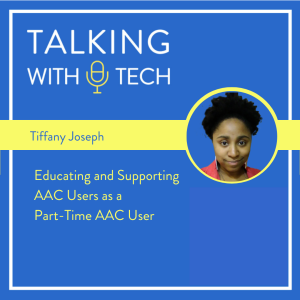
Friday Apr 26, 2024
Friday Apr 26, 2024
This week, we present Part 1 of Rachel’s interview with the amazing Tiffany Joseph (@nigh.functioning.autism)! Tiffany is an autistic mother of three neurodivergent teens, as well as an educator, advocate, and a part-time AAC User with inconsistent verbal speech. She explains more about situations when verbal speech becomes difficult, the ways that writing text out before hand helps her, strategies she uses when she has trouble with verbal speech, and more!
Before the interview, Chris and Rachel discuss a listener question from a parent of a teen who wants more authentic inclusion for her child, but she feels like encouraging more authentic inclusion is not very achievable. Chris and Rachel discuss the difficulty living in a world that isn’t universally designed, how we can use IEP accommodations to support UDL, cultivating belonging through inclusion, and more!
Key ideas this week:
🔑 People will point out when someone doesn’t talk as much, and it often feels uncomfortable for that person. Not everyone talks all the time, but there is often an unspoken judgement when people are described as “not talking as much.” Sometimes it feels to Tiffany that she always has to be doing something extra, like talking, for others to feel happy.
🔑 Tiffany is a dyspraxic multi modal communicator with inconsistent motor plans, including with inconsistent verbal speech. Difficulty with motor plans can include routine activities, like brushing her teeth. Some people have entire bodies like this, while other people have only parts of their bodies with these kinds of motor difficulties. You can get really anxious in social situations when your speech and motor plans work inconsistently.
🔑 Be thoughtful about saving a student’s energy for learning & communicating, and try not to overdo repetitive daily tasks you know they can do. There isn’t an unlimited well of energy available, so we should be thoughtful with what we are asking someone to do. For example, don’t want to focus on handwriting so much that it limits progress on spontaneous communication.
Visit talkingwithtech.org to listen to previous episodes, find new resources, and more!
Help us develop new content and keep the podcast going strong! Support our podcast at patreon.com/talkingwithtech!
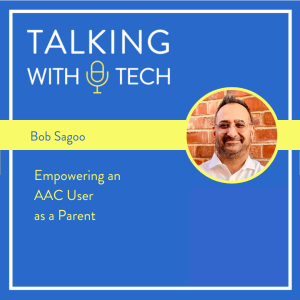
Wednesday Apr 17, 2024
Wednesday Apr 17, 2024
This week, Chris and Rachel interview Bob Sagoo! Bob is the father of Harchie, an 18-year-old young man with cerebral palsy who uses an AAC device with eye tracking to communicate (along with other modalities). Bob shares about Harchie’s AAC journey, Bob’s work to get Harchie mainstreamed in school, Harchie going to college, and more!
Before the interview, Chris and Rachel talk about delivering fun experiences while teaching about language with AAC! They share about why we need to bring playfulness and a playful energy, and some ideas for ways we can bring the fun, like humor, music, dressing up, painting, and modifying games!
Key ideas This Week:
🔑 Parents need to feel empowered - in any situation, parents are the expert when it comes to their child. It’s Ok to respect specialists for their experience and knowledge, but when it comes to your child, you are the expert. You are their advocate and speak on their behalf until they are able.
🔑 It’s for OK not to be OK. There is often a lot behind the scenes going on within families that we don’t see, especially for families of children with complex bodies. We need to give parents grace when working with them - if they don’t do something we recommend, there is probably a reason other than “they don’t care.”
🔑 Bob says the feeling he gets when he wakes up at three in the morning, of “I don’t know what my kid is going to do after I’m gone,” doesn’t really go away, but it can be helped a lot by taking the time to reach out and find out as much as you can. That will help you become as informed as possible as you learn about what your child needs.
🔑 If parents are feeling overwhelmed by information about their child’s needs and don’t know where to start, one good place is to connect with other parents of children with special needs, They can help you get started moving in the right direction, and anytime you’re going through something difficult, knowing you’re not alone can be very powerful!
Visit talkingwithtech.org to listen to previous episodes, find new resources, and more!
Help us develop new content and keep the podcast going strong! Support our podcast at patreon.com/talkingwithtech!
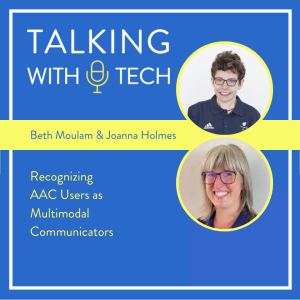
Wednesday Apr 10, 2024
Wednesday Apr 10, 2024
This week, we hear Chris’s interview with Beth Moulam and Joanna Holmes! Beth is a master student, former Paraolympian, a Trustee of Communication Matters (a branch of ISSAC), and patron of a charity called One Voice. She is a multi modal communicator who often uses AAC devices to communicate. Joanna (@mummyvsaac on Instagram) is the mother of Lucy, a 9-year-old multimodal communicator with a complex medical history that includes a genetic component. They share about Beth’s AAC journey, the importance of a language rich environment on AAC development, the multimodal nature of communication, and more!
🔑 Beth doesn’t feel she will ever reach her final communication destination, because she is always learning. Learning to use AAC is a labor of love, it takes hours of practice and lots of resilience for the user, families, and their support networks.
🔑 Beth and Joanna both emphasize the many modes of communication a complex communicator uses to communicate. A person’s communication “system” is more than the AAC app a person uses, it is everything that person does to communicate with others.
🔑 There is a popular misconception that getting an AAC device will lead to lots communication. You also need the language to use it, which for some is a long jump. Learning to use AAC for most people isn’t like flicking a switch, its like building a house - it takes a team of people, doing their best to do things in the right order, learning nail-by-nail, to use AAC together.
🔑 Beth had a communication rich home environment as a child, including being read to daily and having phonics on her bedroom wall that she discussed with her mother. She believes this was really important to her literacy and ability to work with AAC at a young age.
Visit talkingwithtech.org to listen to previous episodes, find new resources, and more!
Help us develop new content and keep the podcast going strong! Support our podcast at patreon.com/talkingwithtech!
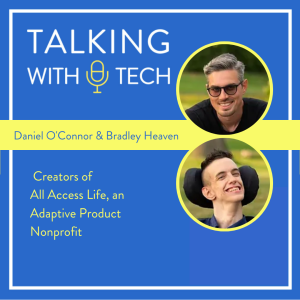
Wednesday Apr 03, 2024
Wednesday Apr 03, 2024
This week, Chris interviews Daniel O’Conner and Bradley Haven of All Access Life! All Access Life is a nonprofit that showcases the latest trends and movements in adaptive products and assistive technologies on their website allaccesslife.org. Daniel & Bradley share about how they met when Daniel was Bradley's Aide in high school (Bradley has nonverbal Dyskinetic Cerebral Palsy), how they came to decide to create a nonprofit together, and how they developed their mission to share information about adaptive products. They also discuss Bradley’s AAC journey and how the technology has progressed from the switches Bradley used as a teenager to the current eye tracking he uses on his TD Pilot device.
Before the interview, Rachel shares about a family who had a very strong emotional reaction to having their child’s voice changed from a child’s voice to a teenager’s voice, and why we need to include the family and give lots of advance warning if we want to make a change to voice output for maturity purposes.
Key Ideas this Week:
🔑 We should try and spread the word about current accessibility gaming options, like Copilot with the Xbox Adaptive Controller, that allow people like Bradley to play video games. Accessable gaming opens up social opportunities and allow users to engage with friends and family in new ways!
🔑 A lot of companies don’t think about the fact that people with disabilities use their product. Big companies like Microsoft embracing inclusive design with their Xbox Adaptive Controller helps move the field forward, but there is more work to be done!
🔑 Bradley says “nothing about us, without us,” meaning he wants companies who create products to get feedback from actual people with disabilities at every step of product creation.
🔑 Playing video games in schools shouldn’t be a carrot at the end of a difficult task, but rather something woven in (e.g. tallying up classroom scores on Rocket League to practice addition) to make learning more engaging.
Links from This Weeks Episode
Miles Harvey - Esports Research and Its Integration in Education (Advances in Game Based Learning)
How to Use Copilot on Xbox
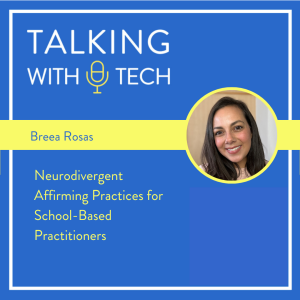
Wednesday Mar 13, 2024
Wednesday Mar 13, 2024
This week, we share Rachel’s interview with Breea Rosas! Breea is a school psychologist who works with educators on how they can implement neurodiversity affirming practices and neurodiversity affirming psychoeducation! Breea shares about the neurodiversity affirming approach and three key areas she works with educators and practitioners to address: 1) What assessments are we choosing; 2) How are we writing assessments; and 3) What are we communicating to the families in meetings?
Before the interview, Chris shares his discomfort with using descriptions that label people as “typical” when the concept of “average” does not really capture the nuances that make up a person and could even be reductive.
Key Ideas this Week:
🔑 Breea always writes reports as if the child will read it in 10 years, and she asks herself “How would it make them feel?”
🔑 We should be thoughtful about the assessments we are choosing. If you know, “Kids with ADHD, they are always bombing assessment X,” then consider giving a different assessment! You don’t always need to get the same tests to every student.
🔑 Parents have a lot of voice in IEP meetings - if as a parent, you hear a goal that doesn’t align with your philosophy, you can say, “This doesn’t align with our goals as a family. We don’t agree with this, we want something more creative.” As a parent. if something feels wrong, you should say something!
Links from This Week’s Episode
“The Myth of Average” Tedx Talk: https://youtu.be/4eBmyttcfU4?si=XcuHQrYCTEznV0iR
Neurodiversity Affirming School-Based & Consulting Practitioners Facebook Group
Autism Level Up: https://www.autismlevelup.com
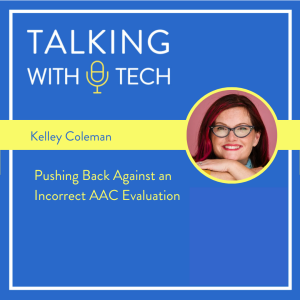
Friday Mar 08, 2024
Friday Mar 08, 2024
This week, Rachel interviews Kelley Coleman, speaker, author, and advocate! Kelley talks about her family’s AAC journey and her role as the mother of Aaron, a complex communicator in the 4th grade who uses AAC to communicate. She shares about her new book, Everything No One Tells You About Parenting a Disabled Child, as well as some of the high- and lowlights of her family’s AAC journey, including when Aaron’s school SLP suggested he go from high-tech AAC to a picture flip book!
Before the interview, Rachel shares about turning a client's questions about her microphone into a naturally occurring communication opportunity about podcasting - that also supported his independence!
Key ideas this week:
🔑 The goal shouldn’t bet just be communication for an AAC user, it should be autonomous communication. Not every student can communicate independently, but every AAC user can learn to communicate autonomously (e.g. share what they want to say, when they want to say it). Rachel was against the flip book because, among other reasons, Aaron wasn't physically able to use it independently.
🔑 Kelley was told by her school SLP, “The only way Aaron will learn to communicate is if you use this flip book with 100% fidelity.” Kelley had so many responsibilities at the time, she couldn’t be with Aaron at every moment, and it made her feel like she was going to fail before she started. You have to meet parents where they are at and make modeling sustainable - something small every day is better than being so overwhelmed that you don’t even start!
🔑 People who support AAC users should always try and keep an open mind in areas where they are not familiar. Often, when a person can’t do something, it isn’t because they are incapable - it’s because we haven’t supported that skill well enough yet!
🔑 Kelley says, as a parent, you should always be cognizant that the members of your IEP team may be providing services to your child for months (or even years) after that IEP meeting. It doesn't always make sense to yell at someone who is going to be providing services to your child for months (or even years) afterwards.
Visit talkingwithtech.org to listen to previous episodes, find new resources, and more!
Help us develop new content and keep the podcast going strong! Support our podcast at patreon.com/talkingwithtech!
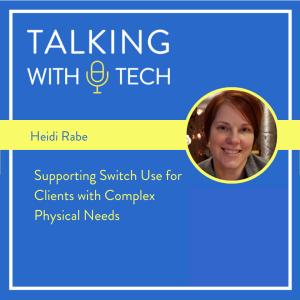
Thursday Feb 29, 2024
Thursday Feb 29, 2024
This week, Rachel interviews Heidi Rabe, an SLP who specializes in supporting AAC users with complex bodies who use switches and scanning to communicate! Heidi shares a wealth of information about scanning and switches, including how to evaluate if a student needs a switch, working with PT/OT to find the right switch spot, using partner-assisted scanning, and more!
Before the interview, Chris and Rachel discuss a question from a listener about a student who is “adding random words” (and how the least dangerous assumption is that it’s purposeful and meaningful, and we should get to the bottom of it)!
Key ideas this week:
🔑 When Heidi is considering scanning and switches for a client, she thinks about whether they can reliably select from the size array that they need in order to communicate. Also, are their motor skills reliable? Are they having difficulty selecting symbols, even with a keyguard or touch guide?
🔑 Partner-Assisted Scanning is a scanning strategy where a partner verbally offers choices at a consistent rate, and the AAC user indicates what word they want. PAS allows for scanning without the time constraints that exist when presenting choices on a speech-generating device. There is usually a book that tells the partner what choices to say, and in what order. That way, the partners are consistent every time, which allows the AAC user to anticipate what words are coming. See a video on it here.
🔑 When you are using auditory scanning on a speech-generating device, you want the preview voice to be very different from the speaker voice. Otherwise, communication partners get confused and respond to the wrong voice. Also, ideally you also want the preview voice to be quieter, and to be transmitted through a personal speaker.
🔑 When doing Partner-Assisted Scanning, Heidi gives the option of “None of those” as the last option. Similarly, after they make a selection, you can offer “I have more to say” “That’s all I have to say” and “Oops, that was a mistake” as choices.
Visit talkingwithtech.org to listen to previous episodes, find new resources, and more!
Help us develop new content and keep the podcast going strong! Support our podcast at patreon.com/talkingwithtech!
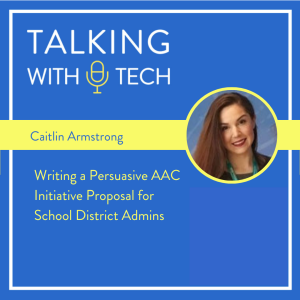
Thursday Feb 22, 2024
Thursday Feb 22, 2024
This week, Chris has a discussion with Caitlin Armstrong, an SLP in New Hampshire who contacted Chris asking about writing up an AAC Initiative proposal for her K-5 school district! Chris breaks down how she should approach the mission statement, ideas for making a more persuasive argument, and things to avoid (e.g. too much research up front).
Before the interview, Chris and Rachel talk about the AI Reading Coach at coach.microsoft.com. It is similar to the Reading Coach that is part of the Immersive Reader tool embedded in Microsoft Word, and allows people to practice reading with someone analyzing their speech in real time!
Key Ideas this week:
🔑 If you are writing an AAC initiative for AAC in your district, start with a mission statement about robust language and what your district believes in. If you start with a statement everyone agrees with and lay out the steps from there, you can get more buy in from the start!
🔑 Chris recommends breaking up AAC implementation into four prongs: Mindset, Training, Coaching, and Tools.
🔱 Mindset - The mindset we need to have is everyone can learn language, and if we give them the right tools and time, they will learn it.
🔱 Training - If training is going to happen, there may not be enough time in the instructional day to add on additional time for staff training. There might need to be substitutes or other resources included to help staff attend the training.
🔱 Coaching - Once you have given your trainings, you need to follow up with more direct coaching on how to provide the services. Admins don’t always think of coaching as separate from training, but the distinction is essential. Coaching can be as brief as a few minutes to reflect after a lesson if you are already in the classroom.
🔱 Tools - You can include a proposal for high tech robust AAC, with an alternate proposal for light tech (e.g. core boards) supports and/or a mix of the two. Ideally, you would have high-tech devices for teachers and staff as well as students who need AAC.
🔑 You can include some links to research about AAC in your proposal, and you want to have that information your back pocket, but you don’t want to go too heavy with research up front. Focus more of your time first on, “We know this is good for kids, you can be assured there is thought behind this and it won’t just be thrown in room, and there will be training and coaching for the team.”
Visit talkingwithtech.org to listen to previous episodes, find new resources, and more!
Help us develop new content and keep the podcast going strong! Support our podcast at patreon.com/talkingwithtech!
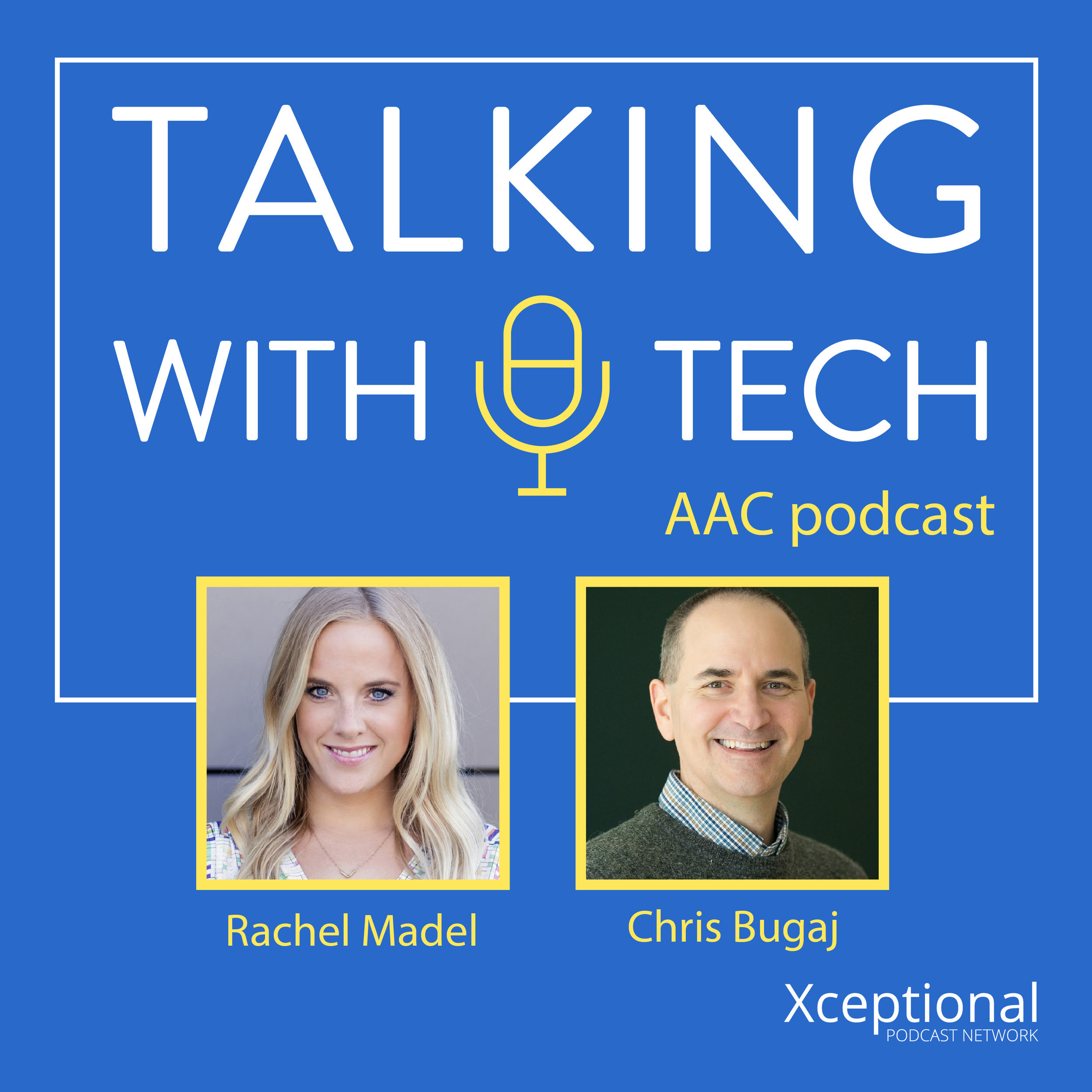
Join AAC experts Rachel Madel and Chris Bugaj as they dive into a weekly discussion about all things AAC (Augmentative and Alternative Communication). Every episode they deliver practical resources, clinical guidelines and relevant research to help clinicians better utilize technology for individuals with complex communication needs.
Episodes include interviews with industry thought-leaders, clinicians, parents, researchers and app developers to keep you on the pulse of the educational technology scene and better support communication through the use of technology.


